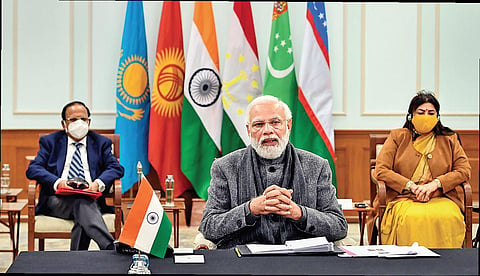

NEW DELHI: The situation in Afghanistan featured prominently in the first India-Central Asia Summit, hosted virtually by PM Narendra Modi on Thursday.
The Summit was attended by the Presidents of Kazakhstan, Uzbekistan, Tajikistan, Turkmenistan and Kyrgyz Republic.
It was decided that a joint working group on Afghanistan would be formed, said Ministry of External Affairs Secretary (West) Reenat Sandhu.
The situation in Afghanistan and its impact on the security and stability of the region was a highlight of the discussions. The leaders felt there is a need to support peace in Afghanistan.
They agreed that terrorism must be comprehensively countered to achieve a ‘world free of terror.’ They expressed satisfaction in their bilateral counter-terrorism military exercises with India.
The leaders reaffirmed the importance of UNSC Resolution 2593 (2021), which unequivocally demands that Afghan territory not be used for sheltering, training, planning or financing terrorist acts and called for concerted action against all terrorist groups, including those sanctioned by the United Nations Security Council. They also agreed to continue close consultations on the Afghanistan situation.
PM Modi spoke about his principle of ‘support for all, development for all, trust for all and efforts for all.’
The Turkmenistan, Afghanistan, Pakistan, India (TAPI) gas pipeline project has been on the backburner for a long time now, due to instability in Afghanistan.
Hopes of reviving this project were raised at the Summit. The leaders felt there would be large-scale and long-term economic cooperation between Central Asian countries and India in order to strengthen and expand inter-region connectivity.
“The leaders expressed solidarity with those affected by the Covid-19 pandemic and called for collective efforts in the fight against the pandemic. They stressed the importance of extensive vaccination, vaccine supply, transfer of technology, development of local production capacities, promotion of supply chains for medical products and ensuring transparency,” said Sandhu.